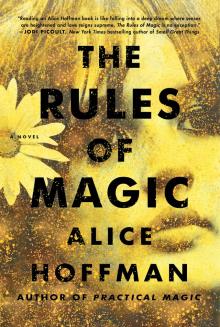- Home
- Alice Hoffman
Angel Landing Page 10
Angel Landing Read online
Page 10
There was the possibility that he might be convicted; he could be put away for years. Finn would grow old and fade; and one day, as he passed by a mirror, there would be no reflection, nothing at all but a spot of light where a man once had been.
“Not you,” I said. “Nothing like that will happen to you.”
Finn ignored me; he shook his head. “It’s bad enough outside, but in jail you can never let your guard down. You pretend to feel nothing, you have to. You pretend it day and night, and then suddenly, it’s true. There’s nothing left inside.”
His memories moved so close to the surface I began to fear that Finn might now try to escape all that he had felt and forgotten: he might leap through the window to the street below, he might slowly become invisible, turning more transparent with each second, until I could look right through him.
“Please sit down,” I said. My voice sounded sharp, as if it might break or dissolve.
“I can’t,” Finn said. He closed his eyes for a second, but even that was too long a time for an outlaw who did not dare relax long enough to rest his blood. He opened his eyes wider and blinked, as if any minute, if he wasn’t terribly careful, he might fall under a spell. I went to the window, I touched his shoulder and tried to get him to turn to me.
“You were once in jail and there’s still something left inside you,” I said. “You didn’t lose everything.”
“It will be worse this time,” Finn said.
“What happened to you?” I asked. “What did you lose?”
Finn shook his head. “You’ll never be able to see the things I tell you; you’ll never understand. It could never be the way it was. It will only be a memory. That’s all it will seem like, but it’s not,” Finn whispered. “It’s still with me.”
Finn finally agreed to tell me; but when he turned from the window and began to speak, I stayed where I was, just to make certain that no one would come for him and take his fugitive heart away from me too soon.
FIVE
HE HAD BEEN DRIVEN UP TO the Stockley school by a county probation officer. Because Finn would not answer any questions, because he simply would not speak at all, the probation officer had slipped a Beatles tape into his cassette player, and they had listened to that one tape over and over again, all the way up to Albany. When they finally reached the school, Finn moved as slowly as a sleepwalker. He tried to listen, but when the probation officer and the headmaster talked to him, they spoke in tongues, and Finn did not understand a word they said. Still, Michael Finn nodded when he was addressed; when he was told where to go, he moved his feet, he walked; there was no point in arguing, there was not even a reason to think; if he could have, Finn would have quietly stopped breathing, he would have collapsed to the floor in a pile of ashes.
Finn had emptied himself, so that he would not be frightened; and he felt nothing at all as he was given a medical examination, issued clothes, and led to the dormitory. Finn was not certain whether or not he was dreaming that night when his new roommates advanced toward him ready to fight. And although Finn’s lip was split, and blood filled his mouth when he tried to eat breakfast the next morning, he had not really been hurt; he had only been told that he was new, and the last in line. That fight was the first of many; Finn never won, he just didn’t care enough to fight hard, sometimes he didn’t bother to protect himself at all. He kept to himself, he was a loner, and soon the other boys grew to ignore him. He was assigned to a job in the machine shop, which he went to each day after classes with no resentment and no joy. And each night, alone in his bed, Michael practiced not feeling until everything inside seemed flat and dry. After a month at the Stockley School, Finn had perfected his method of walking through his daily routine without thinking; of course, he was disguised—he looked real as anyone else as he strode across the campus of the Stockley School; although no one knew it, Finn was invisible, he was never really there.
It was not until he was attacked in the toilet of the machine shop that Finn felt anything, and then suddenly there was a sharp shiver of emotion when they held him up against the cement wall. Two boys held him and a third, named Caesar, unzipped Finn’s jeans and pulled them down below Finn’s knees.
“Are you a queer?” one boy asked, much too close to Finn’s ear, so that each word was like an explosion.
“What are you talking about?” Finn said, wondering if his supervisor in the shop would miss him, wondering if anyone would miss him if he disappeared.
“You know what he’s talking about.” Caesar, who had been at the Stockley School for three years, smiled. “You like to do it with other guys.”
Finn’s exposed penis grew smaller and smaller, as if he could withdraw into himself protectively.
“Are you crazy?” Finn said, unable to pretend he was invisible, unable to stop his stabs of panic.
“He wants to know if I’m crazy,” Caesar smiled.
“We’re going to let you do what you like to do so much,” said one of the boys holding Finn up against the wall.
And as Finn watched, terrified, still as stone, Caesar unzipped his own jeans. “That’s right,” he said. “And be careful not to bite,” he warned. “Or we can remove every tooth in your mouth.”
Finn had eleven more months to serve at Stockley; and that day, in the toilet, eleven months might as well have been the rest of his life. He might have shouted out or screamed, but Finn was certain that no one would hear him, no one would answer. He rested his head against the cement wall and concentrated on his breathing; he closed his eyes and tried to make his heart die. But his heart was still moving when one of the boys forced Finn to go down on his knees; and Finn was resigned to anything that might happen to him, when the toilet door opened. Finn’s attackers looked up, uncertain, ready for a fight.
Herman, a tall black boy who had been sent to Stockley on charges of armed robbery, closed the door behind him. “Now what the hell are you doing?” Herman asked softly, but his eyes were as mean as thunder, and there weren’t many at Stockley who dared to talk back to Herman, especially when his hands, which were stronger than those of men twice his age, were clenched into fists.
Caesar smiled vaguely. “Nothing,” he said.
“What do you mean ‘nothing’?” Herman said. “This,” he pointed to Finn on his knees, “looks like something.”
“He likes to do it with guys, so we’re going to let him do it,” the boy who held Finn around his throat said, but he loosened his grip and eyed Herman nervously.
“How do you know that’s what he likes?” Herman asked. “Did he tell you that?” When no one answered, Herman snorted and shook his head. “Get your pants up,” he told Caesar. Caesar quickly pulled up his jeans and zipped them. “That’s right,” Herman nodded. “Now get out of here.” Finn’s attackers stood their ground, but they shifted their weight from foot to foot. “You heard me,” Herman said. “Go on.” He smiled as the boys edged toward the door. “Scat.”
Finn and Herman looked at each other. Finn’s heart fluttered and jumped, and if Herman took one step toward him he was ready to close his eyes. He would simply float away and leave his body far behind; he would soar until no one could touch him.
“You sure look like a fool,” Herman said finally. “You’re bound to trip on those pants when you walk if you don’t pull them up.”
Finn eyed Herman cautiously.
“Go on,” Herman nodded: “Get up. I’m not going to do anything to you.”
Finn stood, pulled his jeans up, and went to the sink; he poured green liquid soap all over his palms. Finn listened carefully; he was ready to give up if Herman should come after him in a flash. But when he turned from the sink, Herman leaned against the wall and shook his head.
“Don’t you ever fight back?” Herman asked.
“They were queers,” Finn said, softly, testing the word out.
“Oh yeah?” Herman said. “And is that bad?”
Finn shrugged his shoulders; he had not thought of good or bad, h
e had only thought of panic.
“Because that’s what I am,” Herman said.
“Oh?” Finn said, surprised that one stranger would admit something like that to another.
“That’s right,” Herman said. “Everybody’s entitled to something. Even in this place it’s nice to get love. But I get mine from David, because me and David are together. I don’t scare little boys in toilets.”
If Finn had not been so detached from everyone at the Stockley School he would have known what everyone knew: that a sixteen-year-old boy named David was not to be fooled with, he was protected by Herman’s reputation, by Herman’s love.
“Well thanks,” Finn said uncomfortably, “for walking in and everything.”
“You should thank me, and you should be embarrassed that you have to thank me.” Herman reached into his pocket for a pack of cigarettes, and offered one to Finn.
“Where did you get this?” Finn said, amazed and hungry for the taste of a cigarette.
“You are very naïve,” Herman said. “Your family can send you cigarettes any time they want to. Just write and ask. Don’t you know anything? You’ve got to understand, even if you don’t know something, you better act like you do. If you’re not a fighter, you better let people think you are.”
Finn thought over Herman’s advice while they finished their cigarettes.
“What are you in for?” Herman asked.
“Nothing,” Finn said. “I was charged for something I didn’t do.”
“You’ve got a lot to learn,” Herman sighed. He tossed his cigarette butt into a urinal and looked hard at Finn. “I said, what are you in for?”
“Car theft,” Finn answered this time.
“That’s more like it,” Herman nodded as he walked toward the door. “You better learn to say what it looks like, not what it is. Don’t bother with the truth.”
Finn took Herman’s advice. He got through the next few months easily: when he couldn’t keep away from everyone else, when he was forced to, he confronted other boys, he no longer pretended to be invisible. He pretended to be tough, at times he could look menacing. But more and more, Finn was afraid; he believed that something would surface in him. He wondered if feelings might someday overcome him, so that suddenly, without any warning, he might break down in tears.
It was not only the pretense of toughness that protected Finn against ridicule or violence, it was his association with Herman. They were not really friends, they had nothing in common, they rarely even spoke; still, Herman made it clear that Finn was not to be bothered, and Finn repaid his debt with the cigarettes his mother now sent him, or with the racing magazines and comic books he was able to buy on rare trips into Albany to the dentist’s office. Herman and Finn did not work side by side in the machine shop; there they ignored one another, they were acquaintances who nodded a greeting and sometimes sneaked out for a shared cigarette. It was after work, in the evenings, that Finn would find his way to Herman’s dormitory room. There Finn would sit, with Herman, and sometimes with David as well, as if Finn could gain a strength that could only be found in Herman’s room.
One evening, as Finn and Herman leafed through magazines, Herman watched Finn carefully.
“You’re not close to anyone, are you?” Herman said.
Finn looked up from his magazine, surprised. “I’m doing all right,” he shrugged. But in truth he was feeling worse and worse every day.
“How can you take it?” Herman shook his head. “It’s one thing to act tough, and it’s another thing to be so tough inside,” Herman said as David walked into the room and began to complain about his job in the kitchen.
Finn could not stand his aloneness, and in spite of himself he had grown close to someone, and that someone was Herman. Finn passed algebra and eleventh-grade English, in the machine shop he learned how to use a drill and a hammer, but the only time he felt real was in Herman’s room. There, he was himself. And Finn himself did not even know how important Herman was to him until Herman started avoiding him.
It began with Herman’s decision to ask for a transfer from the machine shop to the kitchen. Soon after, Herman chose a different table to sit at in the dining room. Then after several evenings of feeble excuses why Finn could not visit his room, Herman finally took to walking out on Finn; he would leave his own room without saying a word. Now Finn could no longer pretend to be invisible, he could not levitate above the Stockley School; he found himself thinking about Herman, not occasionally, but all the time, as if Finn had become possessed. The evenings were long, and Finn spent his time wondering what he might have done to turn Herman away from him. On a Friday night, in the recreation room, Herman walked away from a card game when Finn sat down. This time Finn followed Herman out into the hallway; this time he stood his ground.
“Tell me what I did,” Finn said.
“Did?” Herman said. “You didn’t do anything.”
“You’re mad at me,” Finn insisted. “Why are you mad?”
“Nobody’s mad,” Herman said. “The problem is David is jealous,” he said simply. “That may sound foolish, that may be foolish, but David wants me not to talk to you. And if that’s what he wants, that’s what I’m going to do.”
The nights were so long now, and no one at all knew Finn, no one but Herman. “I can come to your room tonight,” Finn said suddenly. “It can be that way with us,” he said without looking at Herman.
“I couldn’t do that,” Herman shook his head. “I could lose David by doing that. David’s jealous, understand?”
Finn’s loneliness came at him in a rush; it was all through his blood. “I’ve got to see you,” he said to Herman, and his voice didn’t sound like his own, his words broke, his words were sobs.
Herman took Finn’s arm and led him to a corner of the hallway, where no one could see when he held Finn close. “Maybe you do have feelings,” Herman smiled. “Maybe you fooled me with those blue eyes.”
Finn did not move; Herman’s touch went right through his shirt, his skin was electrified, currents flowed straight to his heart. “I don’t want to lose you,” Finn admitted.
Herman held him tighter, but after a while, he dropped his arms and backed away. “You’ve got to understand,” Herman said. “David and me are both here for another year. You’ll be getting out soon. You’d be leaving me. And I just can’t risk that. It would just be too lonely to be alone.”
Finn nodded, he said he understood and he watched Herman walk away; and later, when he was in bed, alone, Finn told himself that he was glad Herman had turned him down. He pretended that he had never meant the offer, that it had all been a joke. But Michael Finn didn’t make jokes; alone, he faced the terrible truth: that he wanted to make love to Herman, and worse, he wanted to be held, to be rocked, just like a child. From then on, David had nothing to worry about: Finn kept away from Herman. He did not want to see Herman’s face or hear his voice, and he did not want to know what stirred him.
Now when Finn walked down the halls of the Stockley School, he watched the other boys carefully; he wondered if everyone knew about him. He might easily be discovered; Herman might have talked about Finn’s proposal, or Finn’s feelings might show in his eyes. But no one paid any attention to Finn, and once again he tried to keep all of his feelings in check; after months of practice, weeks of being alone, Finn was again in control of his feelings: nothing escaped.
And Herman had been right; before he knew it, Finn’s time at Stockley was up; he was released two days before his seventeenth birthday. There was no one for Finn to say goodbye to on the day of his release; he packed his bags and walked across the lawn to the administration building, where his parents waited. Less than a year after he left Stockley, Finn tried to contact Herman, on a whim, without thinking first. He had gone to a phone booth in Ruby’s Café on Main Street and called long distance; it took quite some time before the clerk at Stockley found Herman’s record, and by the time Finn was told that Herman had been picked up on burglary ch
arges two months after his release from Stocklcy and then sent to Attica, all of Finn’s change had run out. But Finn never imagined Herman in an upstate prison; he always remembered him as he had last seen him on the evening when Finn walked toward the administration building, and Danny Finn’s waiting Oldsmobile.
That evening the sun was setting and crickets had begun to call; Herman was walking back from the dining room to the dorm. His arm was thrown over David’s shoulders as they walked; and then Herman stopped for a moment to look up. He reached to point out something far above, a hawk or a cloud. And as he watched, secretly, from a distance, Finn could not imagine that any face could be as sweet as the one that looked upward in the middle of a huge lawn, in a school outside of Albany from which no one ever really escaped.
Finn waited until Herman was out of sight, until he could no longer see his friend, and then he walked on across the lawn, carrying his bags, not daring to look back. In the headmaster’s office, Ada and Danny Finn sat awkwardly in leather chairs.
“Here he is,” the headmaster shouted when Finn came through the door. “Here’s our boy.”
Ada Finn rushed over and kissed Michael’s cheek; Danny Finn stood and shook his son’s hand; but even though Finn greeted his parents, he was thinking about Herman, he was wondering why everything hidden inside himself had escaped once Herman had touched him.
“I hope things have changed,” Danny Finn said. “I hope you’ve made a man out of him.”
“Oh yes,” the headmaster nodded. “I’m sure we have.”
Again, Finn took Herman’s advice; he pretended that there were no tears inside; he had learned to act the way he was supposed to be, not the way he was. And so, instead of running back across the lawn and searching for Herman in every room, instead of dropping to his knees on the thick wall-to-wall carpeting of the headmaster’s office and howling until all of the pain inside evaporated, Michael Finn reached out and shook his father’s hand, and he left the Stockley School, supposedly a free man.

 The Story Sisters
The Story Sisters Local Girls
Local Girls Blue Diary
Blue Diary The River King
The River King Here on Earth
Here on Earth Illumination Night: A Novel
Illumination Night: A Novel The Marriage of Opposites
The Marriage of Opposites Nightbird
Nightbird Incantation
Incantation Skylight Confessions
Skylight Confessions The Ice Queen
The Ice Queen Second Nature
Second Nature Fortune's Daughter: A Novel
Fortune's Daughter: A Novel Seventh Heaven
Seventh Heaven The Rules of Magic
The Rules of Magic The Red Garden
The Red Garden The Third Angel
The Third Angel White Horses
White Horses Property of / the Drowning Season / Fortune's Daughter / at Risk
Property of / the Drowning Season / Fortune's Daughter / at Risk Angel Landing
Angel Landing Magic Lessons
Magic Lessons Turtle Moon
Turtle Moon Aquamarine
Aquamarine The World That We Knew
The World That We Knew Faithful
Faithful The Dovekeepers
The Dovekeepers The Foretelling
The Foretelling Green Angel
Green Angel At Risk
At Risk Green Heart
Green Heart Fortune's Daughter
Fortune's Daughter Faerie Knitting
Faerie Knitting Incantation (v5)
Incantation (v5) Green Witch
Green Witch Practical Magic
Practical Magic The Museum of Extraordinary Things
The Museum of Extraordinary Things The Probable Future
The Probable Future Illumination Night
Illumination Night The Dovekeepers: A Novel
The Dovekeepers: A Novel Property Of, the Drowning Season, Fortune's Daughter, and At Risk
Property Of, the Drowning Season, Fortune's Daughter, and At Risk